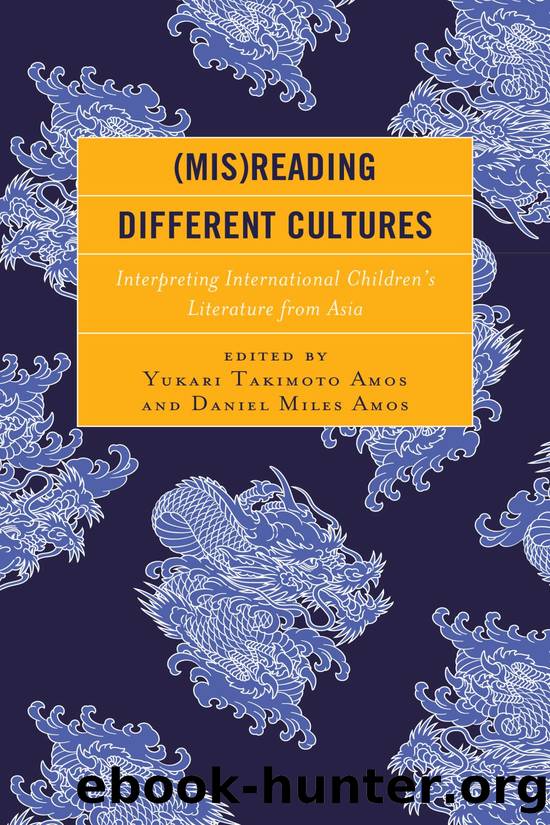(Mis)Reading Different Cultures by Amos Yukari Takimoto;Amos Daniel Miles;

Author:Amos, Yukari Takimoto;Amos, Daniel Miles;
Language: eng
Format: epub
Publisher: Rowman & Littlefield Publishers, Incorporated
Chapter 5
Remembering the Dark Past
Stories of the Korean War and Korean Immigration in American Childrenâs Literature
Chong Eun Ahn
Modern educational settings strive to introduce children to intercultural encounters, often by having students read books containing diverse, multicultural, and international elements. Transnational or transregional migrations are part of the everyday lives of people in globalizing economies as well as the tragic wars of the twentieth century. Together, these migrations function as pull and push factors to make societies diverse and transformative.
In such a social context, educators and students inevitably engage in cultural differences in the classroom. Educators in the English-speaking world often use literature written in English by authors who represent their home countriesâ culture and history; some view this as a contribution to childrenâs understanding of the cultural and historical backgrounds of immigrant classmates, their neighbors, or themselves.
However, the production of racial and ethnic hierarchies, stereotypes, and identity politics continues and develops in the classrooms and in other social spaces, even when encouraging cultural differences and historical understandings through the use of diverse materials. What could be the problems in using such materials? What could be more critical ways to use such literature of and by the Other?
While raising and responding to these questions, this chapter aims to provide methods for conducting historical analyses of minority childrenâs books by focusing on the literature that presents the history of modern East Asia from Korean American voices. It analyzes how some Korean American authors of the childrenâs books portray the experiences of Koreans in the mid-twentieth century, when people living in the Korean peninsula went through colonization, World War II, and the Cold War.
The analysis leads one to critically inquire about the (mis)representations of Korean history, culture, and identity in childrenâs literature in English. Specifically, this chapter examines how memories of some Korean American authors function in the portrayal of Koreans in the twentieth century. As the stories and images from the selected childrenâs books derive from the writersâ or their acquaintancesâ memories of the past, a mixture of emotions and sentiments (e.g., sadness, fear, longing, warmness, love, and hope) appears in the literature.
The discussion herein argues that these perhaps nostalgic or perhaps historical elements ask for further analytical approaches to the style and content in the literature rather than simply taking away informative lessons from them. Simple knowledge-making possesses risks of children making not only ahistorical but also disempowering assumptions about the cultures and identities of various Koreans, Korean Americans, and themselves.
Celebrating differences by imagining that certain characteristics, sentiments, or stories from the books represent an authentic or legitimate Korean and Korean American past may limit childrenâs ability to grasp that cultures and identities are fluid historical products that are changeable and challengeable (Kim, 1997; Yu, 2001).
Books and Contexts
A gradual increase in Korean and Korean American childrenâs literature has become evident as part of the rise of Asian American childrenâs literature since the 1990s (Wee, Park, & Choi, 2015). The publication of picture books such as Halmoni and the Picnic (Choi, 1993) and Dumpling Soup (Rattigan, 1998) exposed children to Korean familial and eating customs.
Download
This site does not store any files on its server. We only index and link to content provided by other sites. Please contact the content providers to delete copyright contents if any and email us, we'll remove relevant links or contents immediately.
The Art of Coaching Workbook by Elena Aguilar(50155)
Trainspotting by Irvine Welsh(21063)
Twilight of the Idols With the Antichrist and Ecce Homo by Friedrich Nietzsche(18314)
The Secret History by Donna Tartt(18253)
All the Missing Girls by Megan Miranda(14833)
Cat's cradle by Kurt Vonnegut(14800)
Ready Player One by Cline Ernest(14058)
Talking to Strangers by Malcolm Gladwell(12911)
Fangirl by Rainbow Rowell(8812)
The Compound Effect by Darren Hardy(8539)
Thirteen Reasons Why by Jay Asher(8485)
The remains of the day by Kazuo Ishiguro(8426)
Periodization Training for Sports by Tudor Bompa(7939)
Tools of Titans by Timothy Ferriss(7844)
Wonder by R. J. Palacio(7753)
The Lover by Duras Marguerite(7603)
Change Your Questions, Change Your Life by Marilee Adams(7397)
A Court of Wings and Ruin by Sarah J. Maas(7301)
The Complete Stick Figure Physics Tutorials by Allen Sarah(7159)
